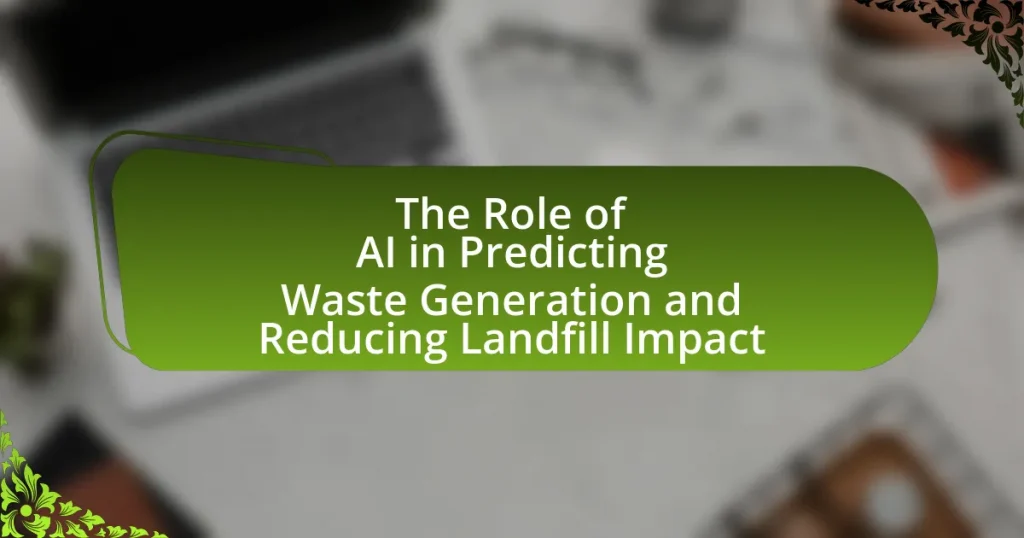Innovative Waste Tracking Software is a digital solution designed to enhance the efficiency of waste management processes by utilizing real-time data collection and analytics. This software integrates technologies such as GPS, RFID, and IoT sensors to monitor waste from its source to disposal, ensuring compliance with regulations and optimizing resource allocation. Key features include automated reporting, compliance management, and data analytics, which collectively improve operational efficiency and reduce costs. The article explores the functionality, benefits, and challenges of implementing this software across various industries, highlighting its role in promoting sustainability and regulatory adherence. Additionally, it discusses future trends and practical tips for organizations considering adoption.
![]()
What is Innovative Waste Tracking Software?
Innovative Waste Tracking Software is a digital solution designed to monitor and manage waste disposal processes efficiently. This software utilizes real-time data collection and analytics to track waste from its source to disposal, ensuring compliance with regulations and optimizing resource allocation. For instance, a study by the Environmental Protection Agency highlights that such software can reduce waste management costs by up to 30% through improved tracking and reporting capabilities.
How does Innovative Waste Tracking Software function?
Innovative Waste Tracking Software functions by utilizing real-time data collection and analysis to monitor waste management processes. This software integrates technologies such as GPS, RFID, and IoT sensors to track waste from its source to disposal, ensuring accurate reporting and compliance with regulations. For example, it can provide insights into waste generation patterns, optimize collection routes, and reduce operational costs by improving resource allocation. The effectiveness of this software is supported by studies showing that organizations implementing such systems can achieve up to a 30% increase in operational efficiency and a significant reduction in waste-related costs.
What are the key features of Innovative Waste Tracking Software?
Innovative Waste Tracking Software typically includes features such as real-time tracking, data analytics, automated reporting, and compliance management. Real-time tracking allows users to monitor waste collection and disposal processes as they happen, enhancing operational efficiency. Data analytics provides insights into waste generation patterns, enabling organizations to optimize waste management strategies. Automated reporting simplifies the documentation process, ensuring compliance with regulations and reducing administrative burdens. Compliance management features help organizations adhere to local and national waste management laws, minimizing legal risks. These features collectively improve the overall efficiency and effectiveness of waste management operations.
How does data collection work in Innovative Waste Tracking Software?
Data collection in Innovative Waste Tracking Software occurs through the integration of various data input methods, including sensors, mobile applications, and cloud-based platforms. These systems capture real-time data on waste generation, disposal locations, and recycling rates, enabling accurate tracking and reporting. For instance, sensors on waste bins can monitor fill levels, while mobile apps allow users to log waste types and quantities. This data is then aggregated in a centralized database, facilitating analysis and reporting that enhances decision-making and operational efficiency in waste management.
What are the primary goals of Innovative Waste Tracking Software?
The primary goals of Innovative Waste Tracking Software are to enhance waste management efficiency, improve data accuracy, and ensure regulatory compliance. This software aims to streamline the tracking of waste from generation to disposal, enabling organizations to monitor waste streams in real-time. By utilizing technologies such as GPS and RFID, the software provides precise data on waste quantities and types, which helps in optimizing collection routes and reducing operational costs. Furthermore, it assists organizations in adhering to environmental regulations by maintaining accurate records and facilitating reporting, thus minimizing the risk of non-compliance penalties.
How does it enhance operational efficiency in waste management?
Innovative waste tracking software enhances operational efficiency in waste management by automating data collection and analysis, which streamlines processes and reduces manual errors. This software enables real-time monitoring of waste generation, collection, and disposal, allowing for optimized routing of waste collection vehicles, which can lead to a reduction in fuel costs and time spent on the road. For instance, studies have shown that municipalities using such software can achieve up to a 20% reduction in operational costs by improving route efficiency and minimizing missed pickups. Additionally, the software provides valuable insights through data analytics, helping organizations make informed decisions about resource allocation and waste reduction strategies, ultimately leading to a more sustainable waste management system.
What role does it play in regulatory compliance?
Innovative waste tracking software plays a crucial role in regulatory compliance by ensuring that waste management practices adhere to legal standards and environmental regulations. This software enables organizations to accurately monitor, document, and report waste generation and disposal activities, which is essential for meeting compliance requirements set by regulatory bodies. For instance, the software can automate the tracking of hazardous waste, ensuring that it is handled and disposed of according to the Resource Conservation and Recovery Act (RCRA) guidelines. By providing real-time data and comprehensive reporting capabilities, innovative waste tracking software helps organizations avoid penalties and maintain their operational licenses, thereby reinforcing their commitment to environmental stewardship and regulatory adherence.
![]()
What are the benefits of using Innovative Waste Tracking Software?
Innovative Waste Tracking Software enhances waste management by improving efficiency, accuracy, and compliance. This software allows organizations to monitor waste generation and disposal in real-time, leading to better resource allocation and reduced operational costs. For instance, a study by the Environmental Protection Agency found that companies using waste tracking systems reduced waste disposal costs by up to 30%. Additionally, the software aids in regulatory compliance by providing accurate records and reports, which can help avoid fines and penalties. Overall, the implementation of such software leads to more sustainable waste management practices and improved environmental outcomes.
How does it improve waste management processes?
Innovative waste tracking software improves waste management processes by providing real-time data and analytics on waste generation and disposal. This software enables organizations to monitor waste streams more effectively, leading to optimized collection routes and reduced operational costs. For instance, a study by the Environmental Protection Agency found that implementing such software can decrease waste collection costs by up to 20% through better route planning and resource allocation. Additionally, the software enhances compliance with regulations by ensuring accurate reporting and documentation of waste disposal activities, thereby minimizing legal risks and promoting sustainability.
What cost savings can be achieved through its implementation?
The implementation of innovative waste tracking software can achieve significant cost savings by optimizing waste collection routes and reducing operational inefficiencies. For instance, studies have shown that waste management companies can reduce fuel costs by up to 30% through route optimization, which minimizes travel distances and time. Additionally, the software can decrease labor costs by automating data collection and reporting, leading to a reduction in manual processing time by approximately 50%. These efficiencies not only lower direct operational costs but also enhance resource allocation, ultimately resulting in overall savings for waste management operations.
How does it contribute to sustainability efforts?
Innovative waste tracking software contributes to sustainability efforts by optimizing waste management processes, thereby reducing landfill waste and enhancing recycling rates. This software enables real-time monitoring and data analysis, allowing organizations to identify inefficiencies and implement targeted strategies for waste reduction. For instance, a study by the Environmental Protection Agency found that effective waste tracking can lead to a 30% reduction in waste generation and a significant increase in recycling rates, demonstrating its impact on promoting sustainable practices.
Which industries can benefit from Innovative Waste Tracking Software?
Innovative Waste Tracking Software can benefit several industries, including manufacturing, healthcare, construction, and food services. In manufacturing, the software helps track waste generated during production processes, enabling companies to optimize resource use and reduce costs. In healthcare, it assists in managing medical waste, ensuring compliance with regulations and enhancing safety. The construction industry can utilize this software to monitor waste from building sites, promoting recycling and reducing landfill contributions. Food services benefit by tracking organic waste, which can be redirected to composting or animal feed, thus minimizing environmental impact. These industries experience improved efficiency and sustainability through the implementation of waste tracking solutions.
What specific applications exist in municipal waste management?
Specific applications in municipal waste management include waste tracking software, automated collection systems, and recycling management platforms. Waste tracking software enables municipalities to monitor waste generation and collection in real-time, improving operational efficiency and resource allocation. Automated collection systems utilize sensors and GPS technology to optimize routes for waste collection vehicles, reducing fuel consumption and operational costs. Recycling management platforms facilitate the sorting and processing of recyclable materials, enhancing recycling rates and promoting sustainability. These applications collectively contribute to more efficient waste management practices, as evidenced by studies showing that municipalities implementing such technologies can reduce waste collection costs by up to 30%.
How is it utilized in commercial waste management sectors?
Innovative waste tracking software is utilized in commercial waste management sectors to enhance operational efficiency and improve waste disposal accuracy. This software enables businesses to monitor waste generation, track disposal processes in real-time, and optimize collection routes, thereby reducing costs and environmental impact. For instance, companies can analyze data on waste types and volumes, allowing for better recycling strategies and compliance with regulations. According to a study by the Environmental Protection Agency, effective waste tracking can lead to a 30% reduction in waste disposal costs for commercial entities.
![]()
What challenges are associated with implementing Innovative Waste Tracking Software?
Implementing Innovative Waste Tracking Software presents several challenges, including data integration, user adoption, and regulatory compliance. Data integration issues arise when the software must interface with existing systems, leading to potential compatibility problems and data silos. User adoption challenges occur as employees may resist changing established workflows, requiring comprehensive training and support to ensure effective use. Regulatory compliance is critical, as waste management is subject to various local, state, and federal regulations, necessitating that the software adheres to these legal requirements to avoid penalties. These challenges can hinder the successful deployment and effectiveness of waste tracking solutions.
What are common obstacles faced during implementation?
Common obstacles faced during the implementation of innovative waste tracking software include resistance to change, lack of user training, and integration challenges with existing systems. Resistance to change often stems from employees’ reluctance to adopt new technologies, which can hinder the software’s effectiveness. A study by the Journal of Cleaner Production found that 70% of change initiatives fail due to employee resistance. Lack of user training can lead to improper usage of the software, resulting in data inaccuracies and inefficiencies. Additionally, integration challenges arise when the new software does not seamlessly connect with legacy systems, causing disruptions in operations. According to a report by Gartner, 60% of organizations experience integration issues during software implementation, which can delay project timelines and increase costs.
How can organizations overcome resistance to change?
Organizations can overcome resistance to change by fostering open communication and involving employees in the change process. Engaging staff in discussions about the benefits and implications of the change can reduce uncertainty and build trust. Research indicates that organizations that actively involve employees in decision-making processes experience a 70% higher success rate in implementing change initiatives. Additionally, providing training and support helps employees adapt to new systems, such as innovative waste tracking software, thereby enhancing efficiency in waste management.
What technical issues might arise during integration?
Technical issues that might arise during integration of innovative waste tracking software include data compatibility challenges, system interoperability problems, and potential security vulnerabilities. Data compatibility challenges occur when existing systems use different formats or standards, making it difficult to exchange information seamlessly. System interoperability problems can arise if the new software does not communicate effectively with legacy systems, leading to inefficiencies and data silos. Additionally, security vulnerabilities may emerge during integration, as connecting multiple systems can expose sensitive data to unauthorized access or cyber threats. These issues highlight the importance of thorough planning and testing during the integration process to ensure a smooth transition and maintain data integrity.
What are best practices for maximizing the effectiveness of Innovative Waste Tracking Software?
To maximize the effectiveness of Innovative Waste Tracking Software, organizations should implement real-time data collection, ensure user training, and integrate with existing systems. Real-time data collection allows for immediate tracking and reporting of waste management activities, enhancing decision-making and operational efficiency. User training is essential to ensure that staff can effectively utilize the software, leading to improved data accuracy and compliance with waste management regulations. Integration with existing systems, such as inventory management and compliance tracking, streamlines processes and reduces redundancy, ultimately improving overall waste management efficiency. These practices are supported by studies indicating that organizations employing comprehensive training and integration strategies experience up to a 30% increase in operational efficiency in waste management processes.
How can training improve user adoption and efficiency?
Training can significantly improve user adoption and efficiency by equipping users with the necessary skills and knowledge to effectively utilize the waste tracking software. When users receive comprehensive training, they become more familiar with the software’s features and functionalities, leading to increased confidence in its use. Research indicates that organizations that invest in training see a 20% increase in productivity and a 30% reduction in errors, as users are better prepared to navigate the system and troubleshoot issues independently. This enhanced proficiency not only accelerates the adoption process but also streamlines operations, ultimately resulting in more efficient waste management practices.
What strategies can enhance data accuracy and reporting?
Implementing automated data collection methods enhances data accuracy and reporting in waste management. Automation reduces human error by utilizing sensors and IoT devices to gather real-time data on waste generation and disposal. For instance, a study by the Environmental Protection Agency indicates that automated systems can improve data accuracy by up to 30% compared to manual entry methods. Additionally, regular data validation processes, such as cross-referencing with external databases, ensure the integrity of reported information. These strategies collectively contribute to more reliable waste management reporting and decision-making.
What future trends can we expect in Innovative Waste Tracking Software?
Future trends in Innovative Waste Tracking Software include the integration of artificial intelligence and machine learning for predictive analytics, enhanced real-time tracking through IoT devices, and increased use of blockchain technology for transparency and security in waste management processes. These advancements aim to improve operational efficiency, reduce costs, and ensure compliance with environmental regulations. For instance, a report by MarketsandMarkets predicts that the global waste management software market will grow from $1.5 billion in 2020 to $3.0 billion by 2025, highlighting the increasing adoption of innovative technologies in this sector.
How will advancements in technology shape waste tracking solutions?
Advancements in technology will significantly enhance waste tracking solutions by integrating real-time data analytics, IoT devices, and machine learning algorithms. These technologies enable precise monitoring of waste generation, collection, and disposal processes, leading to improved efficiency and reduced operational costs. For instance, IoT sensors can provide real-time data on waste levels in bins, allowing for optimized collection routes and schedules, which can reduce fuel consumption by up to 30%. Additionally, machine learning can analyze historical waste data to predict future trends, helping organizations make informed decisions about resource allocation and waste reduction strategies. This integration of advanced technologies not only streamlines waste management processes but also supports sustainability goals by minimizing landfill use and promoting recycling initiatives.
What role will artificial intelligence play in future developments?
Artificial intelligence will play a crucial role in future developments by optimizing waste management processes through enhanced data analysis and predictive modeling. AI technologies can analyze vast amounts of waste data to identify patterns, predict waste generation trends, and improve recycling rates. For instance, a study by the World Economic Forum highlights that AI can reduce waste management costs by up to 30% by streamlining operations and improving resource allocation. This integration of AI into waste tracking software will lead to more efficient waste disposal, better compliance with regulations, and increased sustainability efforts.
What practical tips can organizations follow when choosing Innovative Waste Tracking Software?
Organizations should prioritize user-friendly interfaces when selecting Innovative Waste Tracking Software to ensure ease of use for all employees. A software solution that is intuitive reduces training time and increases adoption rates, leading to more efficient waste management practices. Additionally, organizations should assess the software’s integration capabilities with existing systems, as seamless data flow enhances operational efficiency. According to a study by the Environmental Protection Agency, organizations that utilize integrated waste tracking systems can reduce waste management costs by up to 30%. Furthermore, organizations must evaluate the software’s reporting and analytics features, as robust data analysis can drive informed decision-making and improve sustainability efforts.


